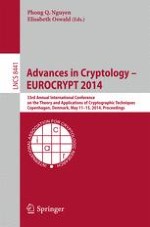2014 | OriginalPaper | Buchkapitel
A Bound for Multiparty Secret Key Agreement and Implications for a Problem of Secure Computing
verfasst von : Himanshu Tyagi, Shun Watanabe
Erschienen in: Advances in Cryptology – EUROCRYPT 2014
Verlag: Springer Berlin Heidelberg
Aktivieren Sie unsere intelligente Suche, um passende Fachinhalte oder Patente zu finden.
Wählen Sie Textabschnitte aus um mit Künstlicher Intelligenz passenden Patente zu finden. powered by
Markieren Sie Textabschnitte, um KI-gestützt weitere passende Inhalte zu finden. powered by
We consider secret key agreement by multiple parties observing correlated data and communicating interactively over an insecure communication channel. Our main contribution is a
single-shot
upper bound on the length of the secret keys that can be generated, without making any assumptions on the distribution of the underlying data. Heuristically, we bound the secret key length in terms of “how far” is the joint distribution of the initial observations of the parties and the eavesdropper from a distribution that renders the observations of the parties conditionally independent across some partition, when conditioned on the eavesdropper’s side information. The closeness of the two distributions is measured in terms of the exponent of the probability of error of type II for a binary hypothesis testing problem, thus bringing out a structural connection between secret key agreement and binary hypothesis testing. When the underlying data consists of an independent and identically distributed sequence, an application of our bound recovers several known upper bounds for the asymptotic rate of a secret key that can be generated, without requiring the agreement error probability or the security index to vanish to 0 asymptotically.
Also, we consider the following problem of secure function computation with trusted parties: Multiple parties observing correlated data seek to compute a function of their collective data. To this end, they communicate interactively over an insecure communication channel. It is required that the value of the function be concealed from an eavesdropper with access to the communication. When is such a secure computation of a given function feasible? Using the aforementioned upper bound, we derive a necessary condition for the existence of a communication protocol that allows the parties to reliably recover the value of a given function, while keeping this value concealed from an eavesdropper with access to (only) the communication.
